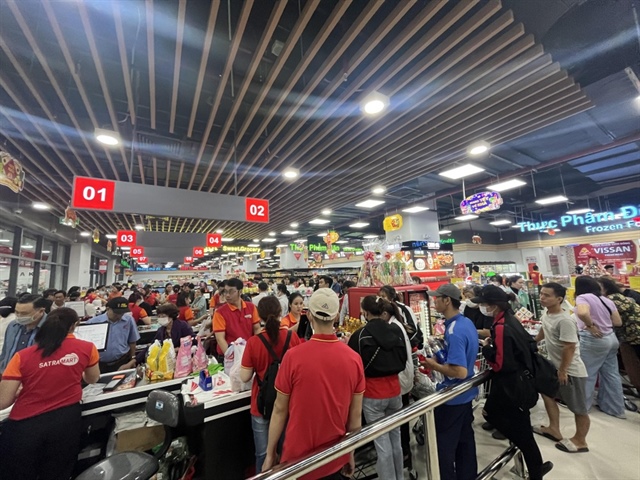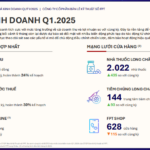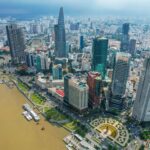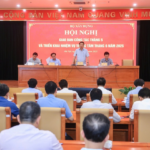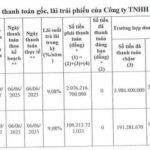The Ho Chi Minh City Business Association (HUBA) has recently reported to the People’s Committee of Ho Chi Minh City on the business community’s performance in May 2025.
Many businesses have orders until the end of the year
According to HUBA, production and business activities in various sectors are regaining momentum, boosting entrepreneurs’ confidence. This recovery is driven by efforts to reform administrative procedures, promote digital transformation in public services, and the role of public investment. Infrastructure projects not only facilitate trade but also offer opportunities for private enterprises to participate, thereby increasing revenue and creating more jobs.
As a result, businesses are stabilizing and showing positive prospects. Many companies have orders until the end of the year, reporting profit growth compared to the same period last year. Notably, some enterprises have proactively reduced their dependence on traditional markets, diversified into new markets, and achieved impressive results.
Specifically, the export turnover of some key product groups has increased significantly. For instance, computers, electronic products, and components increased by 36.2%; textiles by 11%; footwear by 14.5%; and notably, toys and sports equipment soared by 83.6%.
However, some industries, such as steel, despite increased revenue, still face challenges such as high inventory levels and thin profit margins. In fact, many steel enterprises reported losses in the first quarter of 2025.
Nevertheless, positive growth prospects are observed in newly recovering sectors such as real estate, livestock, seafood, and retail.
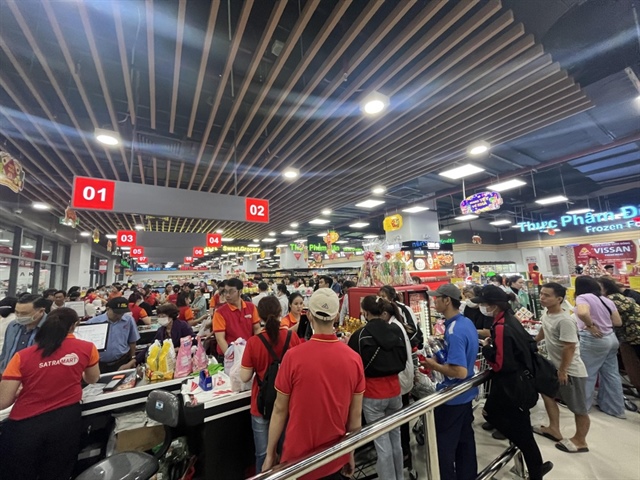
The retail sector, one of the newly recovering groups, is experiencing robust growth. Photo: TU UYEN |
Enterprises still face challenges with procedures
HUBA acknowledges that the state and management agencies have actively reformed administrative procedures, benefiting enterprises. However, businesses still anticipate more substantial reforms to reduce waiting times and simplify reporting procedures.
Specifically, business registration procedures require enterprises to have a clear and legal address. In some cases, registering an address in a residential building, even on a commercial floor with a separate entrance, is not accepted.
In their operations, enterprises are apprehensive about inspections and audits, which are sometimes conducted inflexibly, focusing on finding faults and imposing penalties rather than providing guidance and support.
Additionally, tax regulations remain a significant challenge. For instance, transactions with partners deemed high-tax risks or strict compliance with invoice and voucher requirements. Any mistakes can lead to hefty administrative fines or even criminal liability.
Notably, the procedure for enterprise dissolution is cumbersome, especially the final settlement for tax code closure. The prolonged process often leaves enterprises in a state of limbo, unable to formally cease operations, as experts have warned.
The association proposes that the state continue administrative reforms, emphasizing improving the sense of responsibility and service attitude of civil servants and promoting digital transformation. Regular monitoring, along with clear reward and discipline policies, are necessary to address the issue of responsibility evasion and neglect within the civil service.
Pressure from inventory, bad debt, and bonds
According to HUBA’s survey, 75% of enterprises are struggling to clear inventory, 67% are facing difficult-to-collect debts, and 50% of enterprises request support in terms of credit access and reduced interest rates.
The pressure intensifies as a large volume of real estate enterprise bonds mature this year, estimated at VND 180,000 billion in 2025, posing a potential risk of default…
Therefore, the association proposes that the State Bank continue the policy of restructuring the debt payment period and maintaining the debt group according to the spirit of Circular No. 02/2023/TT-NHNN. At the same time, allow the rescheduled debt in 2025 to be gradually paid back in the final years of the loan contract.
HUBA also suggested that the State Bank encourage commercial banks to share difficulties with businesses and consider fixing the “net interest margin” (NIM) at an average rate of about 3%.
|
Business plans canceled due to land procedures Access to land remains a significant barrier for private enterprises, especially small and medium-sized enterprises. The survey reveals that 74% of enterprises have had to delay or cancel business plans due to administrative procedures related to land use. In reality, many small businesses have built factories on individually owned agricultural land. While this situation has existed for years, recently, authorities have tightened regulations, refusing to issue fire protection and environmental certificates or even renewing business licenses, citing “illegal land use.” As a consequence, enterprises face the risk of production suspension, legal entanglements, inability to access loans or expand their scale, while vast areas of agricultural land remain unused due to lack of proper planning. HUBA proposes that the state implement breakthrough policies, allowing enterprises and individuals to use agricultural land (except rice and protective forest land) for production and business activities, provided that it does not affect the locality’s overall planning. Enterprises should commit to voluntarily dismantling structures and waiving compensation claims when the state retrieves the land for public purposes. |
TU UYEN
– 15:07 06/10/2025
The Pain of Permit Cancellation: A Universal Woe!
The recent news of proposed changes to construction permit requirements has sparked interest among the public. While this initiative is a directive from the government and a proposal from relevant agencies, it also addresses a pressing need of the people. However, to avoid potential negative consequences, careful preparation in terms of institutional, human, and technological aspects is necessary before eliminating permit requirements.
“Uniting Three Powerhouses: The Vision for Ho Chi Minh City, Binh Duong, and Ba Ria – Vung Tau”
The Chairman of Ho Chi Minh City People’s Committee has instructed relevant units to accelerate the implementation of the proposal to merge and reorganize the provinces of Ba Ria – Vung Tau, Binh Duong, and Ho Chi Minh City.

